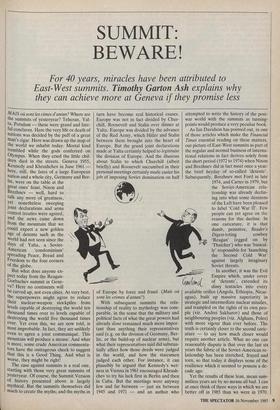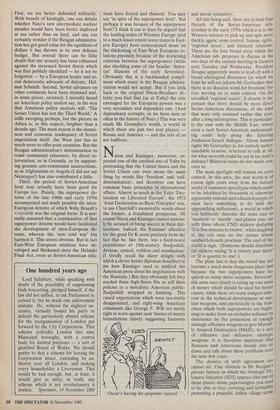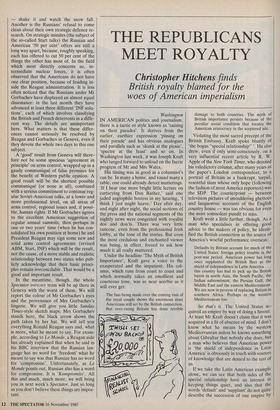SUMMIT: BEWARE!
For 40 years, miracles have been attributed to they can achieve more at Geneva if they promise less
MATS oit sont les times d'antan? Where are the summits of yesteryear? Teheran, Yal- ta, Potsdam — these were grand and fate- ful conclaves. Here the very life or death of nations was decided by the puff of a great man's cigar. Here was drawn up the map of the world we inhabit today. Mortal kind trembled while the gods conferred on Olympus. When they cried the little chil- dren died in the streets. Geneva 1955, Kennedy and Khrushchev in June 1961 here, still, the fates of a large European nation and a whole city, Germany and Ber- lin, were on the table at the great ones' feast. Nixon and Brezhnev — well, hard to talk any more of greatness, yet nonetheless sweeping joint declarations and arms control treaties were agreed, and the news came down from the mountain that we , could expect a new golden age of detente such as the world had not seen since the days of Yalta, a Soviet- American 'condominium' spreading Peace, Bread and Freedom to the four corners of the globe.
But what does anyone ex- pect today from the Reagan- Gorbachev summit in Gene- va? Here no continents will be carved up, not even cities. At very best, the superpowers might agree to reduce their nuclear-weapon stockpiles from levels capable of destroying the world ten thousand times over to levels capable of destroying the world five thousand times over. Yet even this, we are now told, is most improbable. In fact, they are unlikely even to agree a joint communiqué. This mountain will produce a mouse. And what is more, some crude American commenta- tors have the outrageous cheek to suggest that this is a Good Thing. And what is worse, they might be right! The case against summits is a real one, starting with those very great summits of yesteryear. Of course, the Summit Version of history presented above is largely mythical. But the summits themselves did Much to create the myths; and the myths in turn have become real historical causes. Europe was not in fact divided by Chur- chill, Roosevelt and Stalin over dinner at Yalta. Europe was divided by the advance of the Red Army, which Hitler and Stalin between them brought into the heart of Europe. But the grand joint declarations made at Yalta certainly helped to legitimise the division of Europe. And the illusions about Stalin to which Churchill (albeit briefly) and Roosevelt succumbed in their personal meetings certainly made easier his job of imposing Soviet domination on half of Europe by force and fraud. (Mail sont les crimes d'antan?) With subsequent summits the rela- tionship of reality to mythology was com- parable, in the sense that the military and political facts of what the great powers had already done remained much more impor- tant than anything their representatives said (e.g. on the division of Germany, Ber- lin, or the build-up of nuclear arms), but what their representatives said did substan- tially affect how those deeds were judged in the world, and how the statesmen judged each other. For instance, it can plausibly be argued that Kennedy's wet- ness in Vienna in 1961 encouraged Khrush- chev to try his luck first in Berlin and then in Cuba. But the meetings were anyway few and far between — just six between 1945 and 1971 — and an author who attempted to write the history of the post- war world with the summits as turning- points would produce a very peculiar book.
As Ian Davidson has pointed out, in one of those articles which make the Financial Times essential reading on these matters, our picture of East-West summits as part of the regular and normal business of interna- tional relations in fact derives solely from the short period (1972 to 1974) when Nixon and Brezhnev did in fact meet once a year: the brief heyday of so-called 'detente'. Subsequently, Brezhnev met Ford in late 1974, and Carter in 1979, but the Soviet-American rela- tionship was already declin- ing into what some denizens of the Left have been pleased to label 'Cold War II'. Few people can yet agree on the reasons for this decline. In one caricature, it is that dumb, primitive, Reader's Digest-toting cowboy `Reagan' (egged on by `Thatcher') who was 'basical- ly' responsible for 'launching the Second Cold War' against largely imaginary Soviet threats.
In another, it was the Evil Empire which, under cover of 'detente', extended its slimy tentacles into every available orifice (Angola, Ethiopia, Nicar- agua), built up massive superiority in strategic and intermediate nuclear missiles, and trampled on the rights of its own peo- ple (viz. Andrei Sakharov) and those of neighbouring peoples (viz. Afghans, Poles) with more vigour than ever before. The truth is certainly closer to the second caric- ature — to say how much closer would require another article. What no one can reasonably dispute is that over the last six years the fabric of the Soviet-American re- lationship has been stretched, frayed and torn, so that today it displays none of the resilience which it seemed to possess a de- cade ago.
Yet the results of these lean, mean sum- mitless years are by no means all bad. I can at once think of three ways in which we are better off in 1985 than we were in 1970. First, we are better defended militarily. With benefit of hindsight, one can debate whether Nato's new intermediate nuclear missiles would have been better deployed at sea rather than on land, and one can certainly wonder if the Reagan administra- tion has got good value for the squillions of dollars it has thrown at its own defence budget. But overall there can be little doubt that our security has been enhanced against the increased Soviet threat which was first publicly identified — let it not be forgotten — by a European leader and so- cial democratic advocate of detente, Hel- mut Schmidt. Second, Soviet advances on other continents have been stemmed and, in some places, reversed. I recently heard an American policy analyst say, in the way that American policy analysts will: 'The Soviet Union has lost the Third World.' A trifle sweeping perhaps, but the picture in Africa is, in this respect, brighter than a decade ago. The main reason is the clumsi- ness and economic inadequacy of Soviet imperialism itself: the West just has so much more to offer poor countries. But the Reagan administration's determination to resist communist takeovers, by direct in- tervention, as in Grenada, or by support- ing genuine anti-communist insurrections, as in Afghanistan or Angola (I did not say Nicaragua!) has also contributed a little.
Third, the period of Soviet-American frost may actually have been good for Europe too. Plainly, the superpower de- tente of the late 1960s and early 1970s accompanied and made possible the intra- European detente of which Willy Brandt's ( tpolitik was the original focus. It is nor- mally assumed that a continuation of that superpower detente would have facilitated the development of intra-European de- tente, whereas the 'new cold war' has harmed it. This seems obvious. But in fact East-West European relations have de- veloped and thickened since the Helsinki Final Act, even as Soviet-American rela- tions have frayed and thinned. You may say 'in spite of the superpower frost'. But perhaps it was because of the superpower frost? I think it can at least be argued that the leading states of Western Europe (and to a much lesser extent some states in East- ern Europe) have concentrated more on the thickening of East-West European re- lations precisely because of the worsening relations between the superpowers (while also shedding some of the headier `deten- fist' illusions of the early Seventies). Obviously this is a backhanded compli- ment which many in the Reagan adminis- tration would not accept. But if you look back to the original Nixon-Brezhnev de- tente you find that (as at Yalta) the role envisaged for the European powers was a very secondary and dependent one. (And dependency corrupts, as we have seen so often in the history of Nato.) This was very much Mr Gromyko's world, a world in which there are just two real players Russia and America — and the rest of us are ballboys.
Nixon and Kissinger, moreover, re- peated one of the cardinal sins of Yalta by pretending that the United States and the Soviet Union can even mean the same thing by words like 'freedom' and 'self- determination', and therefore can have common basic principles in international affairs. Almost as much as the Yalta 'Dec- laration on Liberated Europe', the 1973 `Joint Declaration on Basic Principles' was, to use Churchill's memorable words about the former, a fraudulent prospectus. Of course Nixon and Kissinger cannot serious- ly be accused of being sincere in these dec- larations. Indeed, the Russians' affection for the great Dr K arose precisely from the fact that he, like them, was a hard-nosed practitioner of 19th-century Realpolitik, devious, cynical, ruthless and mendacious. (I vividly recall the sheer delight with which a clever Soviet diplomat described to me how Kissinger used to mislead the American press about his negotiations with the Russians.) But they obviously felt they needed these high-flown fibs to sell their policies to a moralistic American public: Realpolitik wrapped in humbug. This raised expectations which were inevitably disappointed, and right-wing American columnists like George F. Will are surely right to warn against such 'tissues of muzzy formulations falsely suggesting harmony `Oscar's having his epigrams capped.' and moral symmetry'.
All this being said, there are at least four threads of the Soviet-American rela- tionship in the early 1970s which it is in the Western interest to pick up and spin more thickly again: arms control, human rights, `regional issues', and bilateral relations. These are the four broad areas which the American side proposes to discuss in the two days of the summit meeting in Geneva next Tuesday and Wednesday. President Reagan apparently wants to lead off with a broad ideological discussion (in which we hope he will not inform Mr Gorbachev that there is no Russian word for freedom) be- fore moving on to arms control. On the so-called 'regional issues', it clearly is im- portant that there should be more direct Soviet-American discussions, of the kind that were only resumed earlier this year, after a long interruption. This is particular- ly the case with the Middle East, where even a tacit Soviet-American understand- ing could help along the faltering Jordanian-Israeli dialogue. About human rights Mr Gorbachev is, for entirely under- standable reasons, reluctant to talk at all: for what on earth could he say in his state's defence? Bilateral issues do not much con- cern us.
The main spotlight will remain on arms control. In this area, the real world is of course light years away from the fantasy world of imminent apocalypse which seems to be inhabited by thousands of otherwise apparently rational and educated people (it must have something to do with the approaching milienium), a world in which you habitually describe the arms race as `madness' or 'suicide', and plaster your car with those idiotic CND stickers declaring `It is five minutes to twelve', while laughing at the old man on the corner whose sandwich-boards proclaim 'The end of the world is nigh.' (Someone should distribute car stickers saying 'It is twenty past three' or 'It is quarter to one'.) The plain fact is that the world has not become a much more dangerous place just because the two superpowers have ac- quired so many more weapons. However, this arms race clearly is eating up vast sums of money which should be used for better causes, while there are some dangers inhe- rent in the technical development of nuc- lear weapons, and particularly in the tran- sition which both superpowers are begin- ning to make from an exclusive reliance on deterrence by the possession of enough strategic offensive weapons to give Mutual- ly Assured Destruction (MAD), to a mix of offensive and defensive strategic weapons. It is therefore important that Russians and Americans should also sit • down and talk about these problems over the next few years.
The chances of swift agreement are almost nil. One obstacle is Mr Reagan's private fantasy in which the Strategic De- fensive Initiative (SDI) appears like one of those plastic dome paperweights you used to be able to buy, covering and invincibly protecting a peaceful, folksy village scene — shake it and watch the snow fall. Another is the Russians' refusal to come clean about their own strategic defence re- search. On strategic missiles (the subject of the so-called Start talks) the Russian and American '50 per cent' offers are still a long way apart, because, roughly speaking, each has offered to cut 50 per cent of the things the other has most of. In the field which most directly concerns us, in- termediate nuclear forces, it is often observed that the Americans do not have one clear position, because of feuding in- side the Reagan administration. It is less often noticed that the Russians under Mr Gorbachev have displayed an almost equal dissonance: in the last month they have advanced at least three different 'INF solu- tions', each of which involves classifying the British and French deterrents in a diffe- rent way. The details are unimportant here. What matters is that these differ- ences cannot seriously be resolved by Reagan and Gorbachev in Geneva, even if they devote the whole two days to this one subject.
A 'good' result from Geneva will there- fore not be some specious 'agreement in principle' on arms control, wrapped up in a gaudy communique of false promises for the benefit of Western public opinion. A good result will be the shortest possible communiqué (or none at all), combined with a serious commitment to continue reg- ular Soviet-American talks, at a lower and more professional level, on all areas of arms control, regional issues and, if possi- ble, human rights. If Mr Gorbachev agrees to the excellent American suggestion of regular annual summits, then perhaps in one or two years' time (when he has con- solidated his own position at home) he and President Reagan may sign some new and solid arms control agreements (revised ABM, Start, INF) which will be the result, not the cause, of a more stable and realistic relationship between two states who pub- licly acknowledge that their basic princi- ples remain irreconcilable. That would be a good and important result.
In the meantime, though, the whole Spectator INFIGHT team will be up there in Geneva with the worst of them. We will report the colour of Mr Gorbachev's eyes and the provenance of Mrs Gorbachev's lingerie. We will give you little Sunday Times-style sketch maps: Mrs Gorbachev stands here, the black arrow shows the path taken by her hat. We will tell you everything Ronald Reagan says and, what is more, what he meant to say. For exam- ple, according to Le Monde, a Reagan aide has already explained that when he said in his BBC interview that the Russian lan- guage has no word for 'freedom' what he meant to say was that Russian has no word for 'compromise'. Unfortunately, as Le Monde points out, Russian also has a word for compromise. It is 'Kompromiss'. All this and much, much more, we will bring you in next week's Spectator. Just so long as you don't believe these things are impor- tant.




































































 Previous page
Previous page